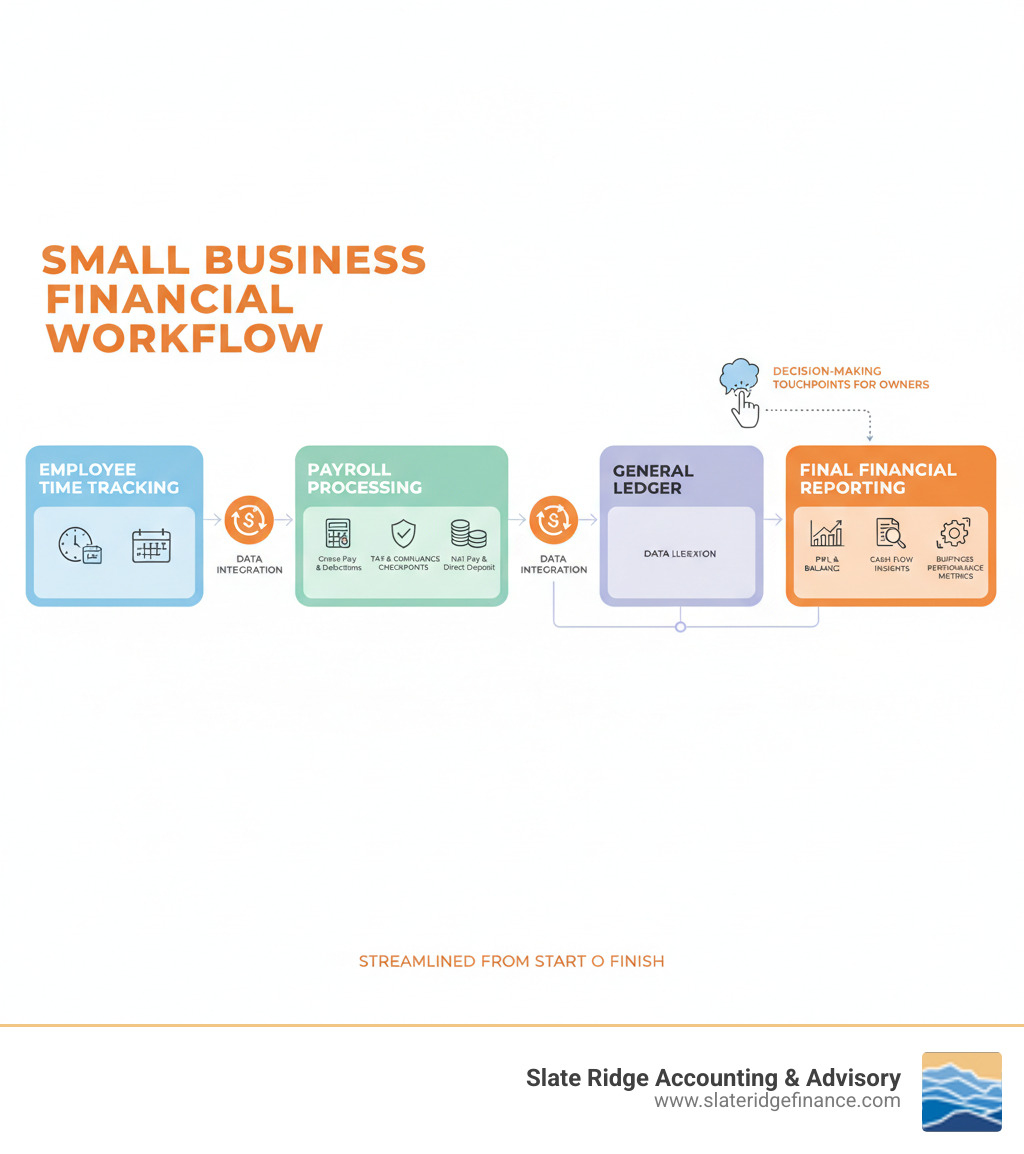Why Small Business Owners Are Making the Switch to Professional Financial Management
Accounting and payroll services for small business have become essential for companies looking to streamline operations, ensure compliance, and focus on growth.
Top accounting and payroll services for small businesses include:
- Automated payroll processing - Direct deposit, tax calculations, and year-end forms
- Cloud-based bookkeeping - Real-time financial reporting and data access
- Tax compliance management - Automatic filings and penalty prevention
- Employee self-service portals - Pay stubs, time tracking, and personal data updates
- Integrated financial reporting - Cash flow insights and business performance metrics
- Expert support - Professional guidance for complex financial decisions
Consider Carmen Narancsik from Glacier Raft Company, who shared: "I no longer worry about year-end tax forms or unemployment filings and can focus on my business." Her experience mirrors that of thousands of small business owners who've found the relief that comes from professional financial management.
The numbers are compelling. Daniel Fayle of Chekkit "cut processing time in half" after switching to professional services. Meanwhile, Vanessa Watchorn of Captains Cabin Cafe finds her payroll takes "no longer than five minutes" every two weeks.
Managing payroll and accounting in-house costs more than most business owners realize. The investment in professional services often pays for itself by avoiding tax penalties, saving administrative time, and reducing costly errors.
This guide will walk you through choosing the right accounting and payroll solution for your business—from understanding core features to navigating compliance requirements.

Explore more about accounting and payroll services for small business:
Understanding Core Features and Benefits
When exploring accounting and payroll services for small business, you'll find a toolbox designed to simplify your financial life. These services aren't just about cutting checks—they handle all the messy details so you can focus on what you love about your business.
Payroll processing is the heart of these systems, and their automation capabilities are impressive. Your employees get paid via direct deposit—no more scrambling to the bank or worrying about lost checks. The system also handles tricky tax calculations, figuring out how much to withhold for federal, state, and local taxes, as well as Social Security and Medicare.
Come tax season, you'll be grateful for the year-end forms feature. Remember those W-2s that used to be a headache? The system generates them automatically. It's like having a tax expert on call, handling state-specifics like Workers' Compensation and unemployment insurance without you having to track requirements.
The beauty of modern Cloud Accounting Services goes beyond basic payroll. These systems manage overtime and commissions, handle deductions for health insurance and savings plans, track benefits like gifts and awards, and even manage paid time off. It's comprehensive coverage that dramatically reduces the chance of costly mistakes.
Data security is taken seriously. Your sensitive financial and employee information gets bank-level encryption and secure cloud backups. Most leading providers maintain uptime reliability above 99.9%, meaning your payroll system is always there when you need it.
Why cloud-based solutions are a game-changer
The move to cloud-based solutions has been a revolution for small business owners. You can manage your payroll from your office, home, or while traveling. Accessibility means any device works: your computer, tablet, or smartphone.
Automatic updates might be the best feature you never think about. Your system gets the latest tax law changes built-in automatically. No more worrying about compliance or scrambling to install updates before payroll day.
Scalability grows with your business. Start with three employees and grow to thirty—your system adapts without a complete overhaul. It's cost-effective because you only pay for what you need.
Disaster recovery provides priceless peace of mind. Your data lives safely in the cloud, protected from everything from coffee spills to natural disasters. Our Virtual Accounting services accept this modern approach, giving you security and flexibility.
How employee self-service empowers your team
Employee self-service features create a win-win situation. Your team gets employee access to their financial information whenever they need it—no more interrupting you for a pay stub or waiting to check their vacation balance.
This reduces admin tasks significantly. Instead of fielding requests for paystub history or updating banking information, your employees handle it themselves through a secure portal. They can update personal information like addresses and phone numbers, and many systems even handle time-off requests with built-in approval workflows.
It's a modern approach to managing Paychecks that respects everyone's time. Your employees feel more in control, and you get back hours each week to spend growing your business instead of managing paperwork.
The Strategic Advantages of Integrated Accounting and Payroll Services for Small Business
Integrating your accounting and payroll services for small business eliminates hours of redundant data entry and the stress of mismatched numbers. When everything works together, your employee's timesheet flows directly into payroll calculations, which then automatically updates your financial reports. No double entry. Single data entry means you enter information once, and the system handles the rest.
Daniel Fayle wasn't kidding when he said he cut his processing time in half. That's the power of automation. Instead of manually calculating wages and then separately recording those expenses, integrated systems handle both steps seamlessly. Your streamlined workflow becomes second nature.
But the real kicker is error reduction. When you're not manually transferring numbers between systems, you eliminate those "oops" moments that can cost time and money. Even small bookkeeping mistakes can lead to big problems. Understanding common pitfalls can save you from costly errors, which is why we recommend reading about 3 Bookkeeping Myths That Could Be Costing You Money.
Leveraging financial data for smarter decisions
Picture this: It's Tuesday morning, and you want to know your business's exact financial standing. With integrated systems, you don't have to wait for reports or dig through files. Real-time insights are at your fingertips.
Cash flow management becomes clearer when payroll expenses automatically appear in your financial dashboard. You can see exactly how much you're spending on labor and how it impacts your overall budget. No surprises, no guesswork.
Integrated systems transform raw numbers into meaningful information. Your Key Performance Indicators (KPIs) aren't buried in spreadsheets. You can track employee costs as a percentage of revenue, monitor seasonal payroll trends, and spot opportunities for improvement.
This visibility makes budgeting feel less like guesswork and more like making informed choices. When you can see how payroll fluctuations affect your bottom line, you're better equipped to plan for busy seasons, bonuses, or new hires.
Our Financial Reporting Services can help you make sense of this data, while Business Financial Forecasting helps you plan for what's ahead.
Opening up growth with better financial visibility
Better financial visibility doesn't just solve today's challenges—it opens doors to tomorrow's opportunities. When you have a clear picture of your true labor costs and their impact on profitability, strategic planning becomes more realistic.
Identifying trends becomes natural when your data flows seamlessly. You might notice that certain months require more overtime or that labor costs spike during specific projects. This knowledge helps you plan better and price more accurately.
Profitability analysis gets interesting when you can easily see how payroll expenses relate to revenue. Which services or products generate the best return after labor costs? Which might need repricing?
This kind of informed decision-making is what separates thriving businesses from surviving ones. When Carmen from Glacier Raft Company says she can focus on her business instead of worrying about tax forms, she's talking about this exact advantage. The administrative burden lifts, and you have mental space for growth.
At Slate Ridge, we've seen how this change happens. Business owners start asking better questions: "Should we hire another employee?" "Can we afford that new equipment?" These questions become answerable when you have clear, integrated financial data.
Ready to explore how this could work for your business? Check out our insights on Business Growth Strategies to see how better financial visibility translates into real growth.
How to Choose the Right Solution for Your Business
Finding the right accounting and payroll services for small business is like finding the right pair of shoes—what works for one business may not work for another. The key is to find a solution custom to your unique needs.

Your business size is the natural starting point. A startup with three freelancers has different needs than a manufacturing company with fifteen employees. Think about where you are now and where you want to be in two years. Scalability is your insurance policy against outgrowing your system.
Industry needs matter. A restaurant handling tips and varying schedules needs different features than a consulting firm with straightforward salaries. The best providers understand these nuances.
Integration capabilities can make or break your experience. If your new payroll system doesn't connect with your existing accounting or time-tracking tools, you'll end up doing double work. Look for solutions that integrate seamlessly with the tools you already use.
Don't underestimate customer support. When you're dealing with paychecks, having knowledgeable help available is essential, not a luxury. The best providers offer multiple ways to reach them, whether by phone, chat, or online resources.
User-friendliness is crucial. The right system should feel intuitive, even on your busiest days. For guidance on finding the right fit, check out our guide to Best Small Business Bookkeeping Packages.
Understanding different pricing models
Pricing for accounting and payroll services for small business comes in several flavors. Understanding them helps you avoid surprises on your monthly bill.
Per-employee pricing is common. You pay a base monthly fee plus a small amount for each person on payroll. This works well for small, stable teams, but costs can add up as you grow.
Base monthly fees offer more predictability. You pay one set amount covering a certain number of employees or a package of services.
Tiered packages give you options to match your needs and budget. Think "Good, Better, Best"—each level includes more features. The trick is to assess what you actually need.
Flat-fee pricing is the simplest model. One price, comprehensive service, no math required. It makes budgeting straightforward.
Watch out for hidden costs in the fine print. Setup fees, year-end processing charges, or extra costs for features like direct deposit can turn an attractive price into an expensive surprise. The best providers are upfront about all costs.
Key questions to ask potential providers
Before you sign on, a few strategic questions can save you headaches. Think of this as your due diligence checklist.
What does your onboarding process look like? Moving payroll providers can feel overwhelming. The best providers assign a specialist to walk you through every step, import your data, and ensure everything runs smoothly.
When can I reach you for help, and how? Payroll emergencies don't always happen during business hours. Understand your support options—whether that's 24/7 phone support, live chat, or online resources—so you feel confident you're never on your own.
How do you protect my data? You're trusting them with sensitive employee and financial information. Look for bank-level security, regular backups, and clear data protection policies. This isn't the place to cut corners.
What if this doesn't work out? Sometimes relationships don't work. Understanding the contract terms and cancellation policy upfront gives you peace of mind. Month-to-month arrangements often work better for small businesses than long-term contracts.
If you prefer working with someone local who understands your community, we can help you find a Bookkeeper Near Me throughout North Carolina, including Asheville, Boone, Charlotte, Greensboro, Greenville, Hickory, Morganton, Raleigh, and Wilmington.
Navigating Compliance and Taxes with Confidence
Tax compliance doesn't have to be a source of stress. While managing compliance for a small business can feel overwhelming, professional accounting and payroll services can simplify the process.

Professional services handle the complex world of federal taxes, state and local taxes, and all the intricate payroll tax filings that change frequently. Think about it—when was the last time you felt confident calculating the exact withholding for each employee? Or knew exactly when each tax payment was due?
Integrated systems take care of year-end reporting automatically. Those essential W-2s and 1099s get generated and distributed without a last-minute scramble. No more late nights figuring out which forms go to whom.
But compliance goes beyond just payroll taxes. Solid record keeping is the foundation of everything else. This means maintaining consistent financial records, tracking every expense, and ensuring your books are always audit-ready. It's about creating a system where compliance happens naturally.
The goal isn't just to meet minimum requirements—it's to give you peace of mind. When compliance is handled professionally, you can focus on growing your business. Comprehensive support covers all these bases, ensuring accounting, tax, and payroll services work together seamlessly.
Automating payroll taxes to avoid costly mistakes
Here's a sobering thought: one missed payroll tax deadline can cost more than a year's worth of professional payroll services. The penalties are steep and add up quickly.
Automatic calculations eliminate the guesswork from tax withholdings. Instead of manually calculating federal income tax, FICA, and state taxes for each employee, the system does it instantly and accurately. These calculations adjust automatically for tax rate changes or when employees hit contribution limits.
Tax deductions happen seamlessly. The system knows exactly how much to withhold from each paycheck and tracks everything throughout the year.
Remittance handling is where automation really shines. Tax payments get submitted to the right agencies on the exact dates they're due. You don't have to remember deadlines or worry about which form goes where. The system handles federal quarterly filings, state monthly payments, and other deadlines that vary by location.
Filing deadlines become someone else's problem. Professional services monitor all important dates and ensure everything is submitted on time. This dramatically reduces your penalty risk and keeps your business in good standing with tax authorities.
When you consider that a single late payment penalty can exceed the cost of services for several months, automation isn't just convenient—it's financially smart. Learn more about protecting your business finances with our guidance on Accounts for Small Business.
Managing accounts payable and receivable effectively
Cash flow is the lifeblood of any small business. Managing it well requires staying on top of both money coming in and money going out.
Integrated A/P and A/R systems give you a complete picture of your cash flow. Instead of juggling separate systems for paying bills and collecting payments, everything flows through one platform. This integration means you can see your exact financial standing at any moment.
Cash flow optimization happens naturally when your systems talk to each other. You can time vendor payments to take advantage of discounts while ensuring you have enough cash to cover payroll and other expenses.
Vendor payments become streamlined when you can track due dates, payment terms, and outstanding balances in one place. You'll avoid late fees and can take advantage of early payment discounts.
Customer invoicing gets faster and more professional. Generate invoices quickly, send them automatically, and track which ones are outstanding. Some systems even send gentle payment reminders, helping you get paid faster.
The beauty of integration is that your accounts payable and receivable work together to optimize your cash position. You can see when big payments are due and plan accordingly, ensuring you always have enough cash to keep operations running smoothly.
For detailed strategies on mastering this equation, check out our Tips for Managing Small Business Accounts Receivable and Payable.
Frequently Asked Questions about Accounting and Payroll Services
When small business owners first consider professional accounting and payroll services for small business, they naturally have questions. These are the conversations we have most often.
Can a small business do its own payroll?
While you can handle payroll yourself, it's rarely the best use of your time. The complexities of DIY payroll can bury a business owner, pulling focus from core operations.
Think about everything involved. You're tracking hours, calculating wages, figuring out federal and state tax withholdings, managing direct deposits, filing tax returns, and preparing year-end forms. That's before even talking about staying current with changing regulations.
The time commitment alone is staggering. Most business owners underestimate how much of their week is consumed by payroll tasks. Then there's the risk factor—one mistake in tax calculations or filing deadlines can result in penalties that far exceed what you'd pay for professional services.
We often tell clients: your expertise is running your business, not becoming a payroll specialist. The peace of mind from knowing experts are handling these critical tasks is invaluable. Our Payroll Management Services take this burden off your shoulders completely.
What do I need to set up accounting and payroll services for small business for the first time?
Setting up your first payroll service doesn't have to be overwhelming. Having the right information ready helps everything move faster.
Start with your business basics: your legal business name, address, and contact information. You'll also need your Employer Identification Number (EIN) and any state tax ID numbers. These are the foundation of your payroll setup.
For your employees, gather their complete details: full legal names, addresses, Social Security Numbers, dates of birth, and hiring dates. You'll also need their wage rates and withholding information from their W-4 forms. If you're offering direct deposit, you'll need their banking details too.
Banking information is crucial. We'll need details for the business bank account that will handle payroll processing and tax remittances.
If you've already been paying employees, bring along your previous payroll records. This includes past pay runs, year-to-date earnings, and tax withholdings. This information ensures we can pick up right where you left off without any gaps.
The good news? Our team walks you through this entire process. We don't just hand you a checklist—we're there to guide you every step of the way.
How much do accounting and payroll services for small business typically cost?
This is probably the question we hear most. Every business owner needs to know what they're investing in their financial management.
The truth is, pricing varies based on your specific needs. The biggest factor is usually your team size—most services charge a base monthly fee plus an additional amount per employee. How often you run payroll also matters. Weekly payroll naturally costs more than bi-weekly or monthly.
Service complexity plays a huge role too. Basic payroll—paying your team and handling taxes—costs less than comprehensive services that include time tracking, HR support, benefits administration, or full accounting integration. You pay for the features you need.
Here's what we always tell our clients: don't just look at the monthly cost. Consider the value. Professional services prevent costly tax penalties, free up hours of your time, and provide expert guidance to help you make better financial decisions. Many business owners find the time savings alone justify the investment.
We've also seen how the right service saves money in the long run. No more scrambling to fix tax filing errors or paying penalties for missed deadlines. Instead, you get predictable monthly costs and the confidence that everything is handled correctly.
The best part? Many providers offer promotional rates to help you get started. It's worth having a conversation about what makes sense for your business.
Conclusion
Finding the right accounting and payroll services for small business doesn't have to be overwhelming. This guide has covered the features, advantages, and considerations that can transform your business finances.
The change is real and measurable. When business owners like Carmen from Glacier Raft Company no longer worry about tax forms, or when Daniel from Chekkit cuts his processing time in half, these aren't just testimonials—they're glimpses into what your business can achieve.
The key takeaways are straightforward: Professional financial management delivers efficiency through automation, ensures compliance through expert oversight, and provides the strategic insights that fuel sustainable growth. Cloud-based solutions offer the accessibility and scalability that growing businesses need, while integrated systems eliminate the errors and inefficiencies of juggling multiple platforms.
At Slate Ridge Accounting & Advisory, we've built our services around these realities. Our virtual bookkeeping, financial clean-up, and advisory services aren't just about keeping your books balanced—they're about helping you track KPIs, forecast growth, and truly take control of your finances. We understand that every small business has unique challenges, and we're here to provide the personalized, industry-custom solutions that make a real difference.
The choice is yours: continue wrestling with payroll complexities and compliance concerns, or redirect that energy toward what you do best—growing your business and serving your customers.
Ready to experience the peace of mind that comes with professional financial management? Your business deserves modern solutions that work as hard as you do. Get started with virtual accounting services today, and let's build a stronger, more profitable future together.
Ready to get started?
Book a free consultation today and let’s explore how Slate Ridge can support your business with expert accounting that’s accurate, timely, and built around your goals.


.avif)



